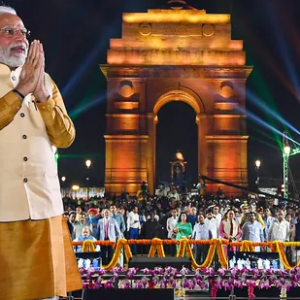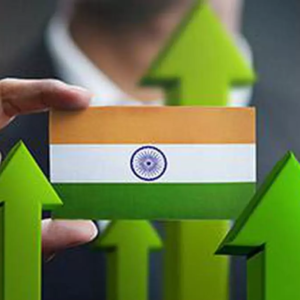Many battles have been fought but there are some battles that have changed the course of history and human destiny. One such battle was the Battle of Haifa fought on the slopes of the sacred Mount Carmel in present day Israel on 23 September 1918. In the wake of the 100 Years of the Battle of Haifa, the Centennial Commemoration was organised by India Foundation in association with Nehru Memorial Museum and Library (NMML) and Indian War Veterans Association on 20 September 2017 at NMML, New Delhi.
The Battle of Haifa was a great victory for Indian Cavalry (then in British Imperial Service), led by the Indian Officers, who displayed unmatched valour, courage and devotion to duty. The Indian troops faced opposing camps of Ottoman empire in large numbers and the victory of the Indian troops subsequently led to the demise of the mighty Ottoman Empire. It also saved the life of Abdul Baha, the spiritual head of the Baha’is, whose message was that of universal brotherhood and equality.
In the commemoration speakers gave insights of the history of the Battle of Haifa and also shared the information about the officers of the Indian troops who fought the battle. Recently during the visit of Prime Minister Narender Modi to Israel, he paid homage to the Indian heroes of the war.
Shri Ram Madhav, National General Secretary of the BJP and Director, India Foundation, in his inaugural address said, “Battle of Haifa is an epitome of a war to achieve peace and restore the natural stability.” He also remembered the unmatched valour of the Indian officers in the troop who laid down their lives to free Abdul Baha and bring victory to the Bahai Community. He stressed on the peace centric element of the war and said “History should not be about fighting in wars and wining it but it should be more about the peace centric element of the war.” He also reminded that the battle of Haifa is considered to be a landmark battle not only because of its outcome but also because it was the last true cavalry charge in the annals of history as thereafter aircraft, tanks and armoured cars had made their appearance in the battle field, leaving no role for horsed cavalry.
Maj. Chandrakant Singh, VrC, Secretary, Indian War Veterans Association, shared significant facts about the battle. He said, “Before the occurrence of the Battle of Haifa, India already had its footprints in sands of time in the Middle East.” He shared glimpses of temples found in those areas. He recalled the role of Sir Pratap Singh who was a part of the battle of Haifa and how he took the responsibility of funding the war requirements of the Indian troops. An unintended though important consequence of the battle of Haifa was the induction of Indians as officers in the British Indian Army.
Brig M S Jodha, Gp. Cdr, NCC, Tejpur, opined that the outcome of the battle of Haifa laid the foundation for the freedom struggle amongst the Indians against the British. He showcased the aggressiveness and strategy with which the Indian troops fought the battle of Haifa. He said “The Jodhpur and Mysore lancers coordinated in an exemplary manner to attack the position acquired in defence by the Ottoman Empire.” Brig M S Jodha gave a brief account on the state of the battlefield. He said “You had steep tracks, Keshon River which run parallel to Mount Carmel but nothing could stop the Indian troops from sealing the victory.”
Col Bhawani Singh, former Commandant, President’s Body Guard and 61 Cavalry (successor to the Jodhpur Lancers), observed that no more remarkable cavalry action of its scale was fought in the whole course of the campaign. He remarked, “In Palestine, the Jodhpur Lancers demonstrated a regiment being officered entirely by Indians and it was equal to if not better than any other regiment of any army in the world.” He also mentioned the role of different Indian officers in the war and how they administered the troops.
Shri Bhaskar Rao, Addl DG, Karnataka Armed Forces, said “Mysore Lancers were positioned behind the Jodhpur Lancers while the Indian troops were attacking the armoured troops of the Ottoman Empire.” He added, “Mysore raised its own cavalry which was equally strong when compared to the other regiments.”
Shri Wajahat Habibullah, former Chief Information Commissioner and former Chairperson, National Commission for Minorities, said “Huge coordination amongst the troops fighting for the same cause was the major reason behind the victory of the forces in the battle of Haifa.” He also said that it was the Indian Officers that played very significant role giving the command and controlling the major coordination of the troops.
Ms Nazneen Rowhani, President, Bahai Association, in her address narrated who Abdul Baha was and how the Mysore Lancers rescued him. She said, “There was an intelligence report about the threat on the life of Abdul Baha and the Mysore Lancers were given the charge of rescuing Abdul Baha.” She added that Abdul Baha praised the Indian Army and said “For two hundred years seven sovereign powers of the world tried to rescue Palestine from the hands of the Turks but the Indian Cavalry rescued the place so speedily and the quickness exhibited by the Indian Troops was breathtaking.”
Chief Guest of the programme, Shri Gajendra Singh Shekhawat, Union Minister of State for Ministry of Agriculture & Farmers Welfare, in his valedictory address observed that the history of many battles not only the Battle of Haifa remains untouched by the young brigade of our country and that we need to put in more efforts to recognise the history and veterans of the war. He stated “War is not won only because of the weapons and artilleries you have, but instead by bravery and valour.”
(This article is carried in the print edition of November-December 2017 issue of India Foundation Journal.)



Thank you for this great article